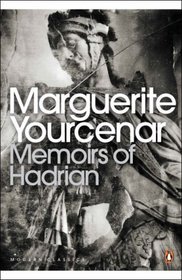Having been reading this for what feels like one hundred years, and realized that I was only on page 100, I have decided to give up. Yes, it is beautifully written ... in its way. It's just that I don't think its way is my way.
Written in the form of a deathbed letter by Hadrian, the only voice you hear is Hadrian's. There are no characters, to speak of. Or rather, should I say, Hadrian alone speaks of the other people in his life -- his birth family, the men who adopted and mentored him after his own father died, his enemies, his friends, the youths he admired and who became, we assume, his lovers. But they are all ciphers -- no voice, no character, nothing but Hadrian's reaction to them. The wife he marries to further advance his place in the family of his predecessor, Trajan, is "difficult." He never says exactly how: we never hear a word from her. The young men who clearly appeal to him are appealing because ... they are young. And handsome and lively. And men. We never hear a word from them, either.
Surprisingly, for a life filled with episode, what happens doesn't feel like a "plot." Something happens, something else happens, Hadrian philosophizes on it, and then something else happens.
There is a LOT of philosophizing.
My husband asked me what this was like, thinking he might be interested. And I replied 1) It sure isn't "I, Claudius" and 2) It's very, very French.
Written in the form of a deathbed letter by Hadrian, the only voice you hear is Hadrian's. There are no characters, to speak of. Or rather, should I say, Hadrian alone speaks of the other people in his life -- his birth family, the men who adopted and mentored him after his own father died, his enemies, his friends, the youths he admired and who became, we assume, his lovers. But they are all ciphers -- no voice, no character, nothing but Hadrian's reaction to them. The wife he marries to further advance his place in the family of his predecessor, Trajan, is "difficult." He never says exactly how: we never hear a word from her. The young men who clearly appeal to him are appealing because ... they are young. And handsome and lively. And men. We never hear a word from them, either.
Surprisingly, for a life filled with episode, what happens doesn't feel like a "plot." Something happens, something else happens, Hadrian philosophizes on it, and then something else happens.
There is a LOT of philosophizing.
My husband asked me what this was like, thinking he might be interested. And I replied 1) It sure isn't "I, Claudius" and 2) It's very, very French.




